
Larry Joe Bird is an American former professional basketball player, coach, and executive in the National Basketball Association (NBA). Nicknamed "the Hick from French Lick" and "Larry Legend", Bird is widely regarded as one of the greatest basketball players of all time. He is the only person in NBA history to be named Rookie of the Year, Most Valuable Player, Finals MVP, All-Star MVP, Coach of the Year, and Executive of the Year.

Jerome Alan West is an American basketball executive and former player. He played professionally for the Los Angeles Lakers of the National Basketball Association (NBA). His nicknames included "the Logo", in reference to his silhouette being the basis for the NBA logo; "Mr. Clutch", for his ability to make a big play in a key situation such as his famous buzzer-beating 60-foot shot that tied Game 3 of the 1970 NBA Finals against the New York Knicks; "Mr. Outside", in reference to his perimeter play with the Los Angeles Lakers and "Zeke from Cabin Creek" for the creek near his birthplace of Chelyan, West Virginia. West played the small forward position early in his career: he was a standout at East Bank High School and at West Virginia University, where he led the Mountaineers to the 1959 NCAA championship game. He earned the NCAA Final Four Most Outstanding Player honor despite the loss in the championship. He then embarked on a 14-year career with the Los Angeles Lakers and was the co-captain of the 1960 U.S. Olympic gold medal team, a squad that was inducted as a unit into the Naismith Memorial Basketball Hall of Fame in 2010. In 2024, he will be inducted to the Hall of Fame as a contributor to the sport as an executive and consultant.
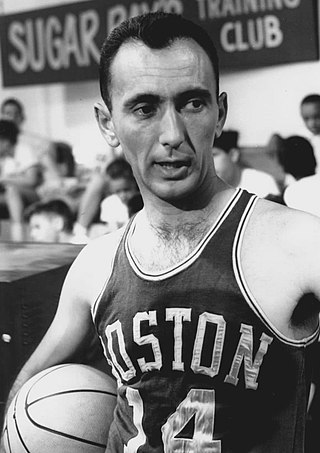
Robert Joseph Cousy is an American former professional basketball player. He played point guard for the Boston Celtics from 1950 to 1963, and briefly with the Cincinnati Royals during the 1969–70 season. A 13-time NBA All-Star and 1957 NBA Most Valuable Player (MVP), Cousy was a core piece during the early half of the Celtics dynasty winning six NBA championships during his 13-year tenure with the Celtics. Nicknamed "The Houdini of the Hardwood", Cousy was the NBA assists leader for eight consecutive seasons, introducing a new blend of ball-handling and passing skills to the NBA. He is regarded as the first great point guard of the NBA, and was the first to reach the 4,000, 5,000, and 6,000 career assists milestones.
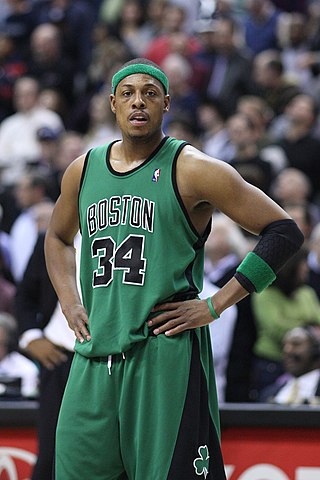
Paul Anthony Pierce is an American former professional basketball player. He played 19 seasons in the National Basketball Association (NBA), predominantly with the Boston Celtics, and was inducted into the Naismith Memorial Basketball Hall of Fame in 2021. He was most recently an analyst on ESPN's basketball programs The Jump and NBA Countdown.
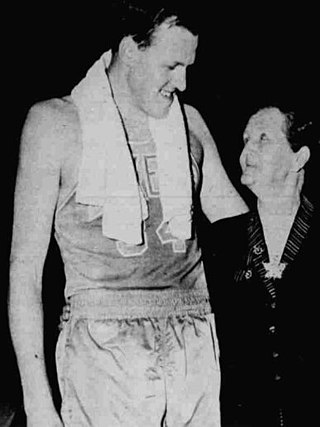
Clyde Edward Lovellette was an American professional basketball player. Lovellette was inducted into the Naismith Memorial Basketball Hall of Fame in 1988. He was the first basketball player in history to play on an NCAA championship team, Olympics gold medal basketball team, and NBA championship squad.

Artis Gilmore Sr. is an American former professional basketball player who played in the American Basketball Association (ABA) and National Basketball Association (NBA). Gilmore was inducted into the Naismith Memorial Basketball Hall of Fame on August 12, 2011.

Robert E. Lee Pettit Jr. is an American former professional basketball player. He played 11 seasons in the NBA, all with the Milwaukee/St. Louis Hawks (1954–1965). In 1956, he became the first recipient of the NBA's Most Valuable Player Award and he won the award again in 1959. He also won the NBA All-Star Game MVP award four times. As of the end of 2022-2023 regular season, Pettit is still the only regular season MVP in the history of the Hawks. Pettit is the leader for most career rebounds (12,849), and most rebounds per game with 16.2 in Hawks franchise history.

Sidney Alvin Moncrief is an American former professional basketball player. As an NCAA college basketball player from 1975 to 1979, Moncrief played for the University of Arkansas Razorbacks, leading them to the 1978 Final Four and a win in the NCAA Consolation Game versus #6 Notre Dame. Nicknamed Sid the Squid, Sir Sid, and El Sid, Moncrief went on to play 11 seasons in the National Basketball Association, including ten seasons with the Milwaukee Bucks. He was a five-time NBA All-Star and won the first two NBA Defensive Player of the Year awards in 1983 and 1984. He was elected to the Naismith Memorial Basketball Hall of Fame in 2019.
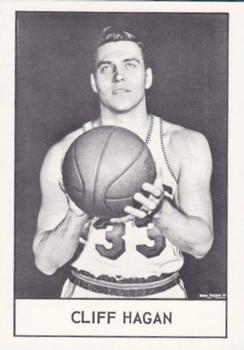
Clifford Oldham Hagan is an American former professional basketball player. A 6′ 4″ forward who excelled with the hook shot, Hagan, nicknamed "Li’l Abner", played his entire 10-year NBA career (1956–1966) with the St. Louis Hawks. He was also a player-coach for the Dallas Chaparrals in the first two-plus years of the American Basketball Association's existence (1967–1970). Hagan is a five-time NBA All-Star and an ABA All-Star. He won an NCAA basketball championship in 1951 as a member of the Kentucky Wildcats, and he won an NBA championship with the Hawks in 1958.
Raymond Darlington Felix was an American professional basketball player. He was born in New York City. He played high school basketball at Metropolitan High School in New York and college basketball at Long Island University. Felix was the No. 1 overall pick of the 1953 NBA draft.
Louis Clyde Hudson was an American National Basketball Association (NBA) player, who was an All-American at the University of Minnesota and a six-time NBA All-Star, scoring 17,940 total points in 13 NBA seasons.
The 1962–63 NBA season was the 17th season of the National Basketball Association. The season ended with the Boston Celtics winning their 5th straight NBA Championship, beating the Los Angeles Lakers 4 games to 2 in the NBA Finals.

Bailey E. Howell is an American former professional basketball player. After playing college basketball at Mississippi State, Howell played 12 seasons in the National Basketball Association (NBA). Howell was a six-time NBA All-Star, two-time NBA champion and was inducted into the Naismith Memorial Basketball Hall of Fame in 1997.

Rodney Clark "Hot Rod" Hundley was an American professional basketball player and television broadcaster. Hundley was the number 1 pick of the 1957 NBA draft by the Cincinnati Royals out of West Virginia University. In 2003, Hundley received the Curt Gowdy Media Award from the Naismith Memorial Basketball Hall of Fame.
The 1962 NBA World Championship Series was the championship round of the 1962 NBA Playoffs, which concluded the National Basketball Association (NBA)'s 1961–62 season. The best-of-seven series was played between the Western Division champion Los Angeles Lakers and Eastern Division champion Boston Celtics. This was the Celtics' sixth straight trip to the Finals, and they won the best-of-seven series in Game 7, 110–107 in overtime. It was the second time in NBA history and the most recent Finals in which the series was decided by overtime in Game 7. The only other Finals series decided in overtime in the seventh game was the 1957 Finals.
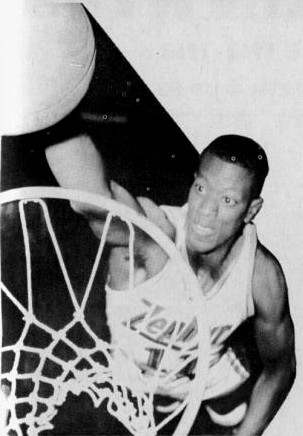
Bill "The Hill" McGill was an American basketball player best known for inventing the jump hook. McGill was the No. 1 overall pick of the 1962 NBA draft out of the University of Utah, with whom he led the NCAA in scoring with 38.8 points per game in the 1961–1962 season.
The 1962 NBA playoffs was the postseason tournament of the National Basketball Association's 1961-62 season. The tournament concluded with the Eastern Division champion Boston Celtics defeating the Western Division champion Los Angeles Lakers 4 games to 3 in the NBA Finals.

Darrell Floyd was an American college basketball All-American while playing for Furman University in Greenville, South Carolina from 1953–56. He was a two-time national scoring champion, two-time Consensus NCAA Division I All-America Second Team selection, two-time South Carolina Player of the Year and two-time Southern Conference Player of the Year. Floyd was just the second player to repeat as NCAA scoring champion. The first was Frank Selvy who also played for Furman with Floyd for one season (1953–54) and won consecutive scoring titles in 1953 and 1954.
Jerry Smith is an American former basketball player. He was the 12th overall pick by the Detroit Pistons in the 1963 NBA draft. Smith came from Corbin, Kentucky to Furman University, where he averaged 23.2 points per game for his career.
The 2021 NBA playoffs was the postseason tournament of the National Basketball Association's 2020–21 season. With the COVID-19 pandemic impacting the NBA for the second consecutive year, the regular season was reduced to 72 games for each team and the start date of the playoffs was moved from its usual time in mid-April to May 22, 2021. It ended with the 2021 NBA Finals in July.













